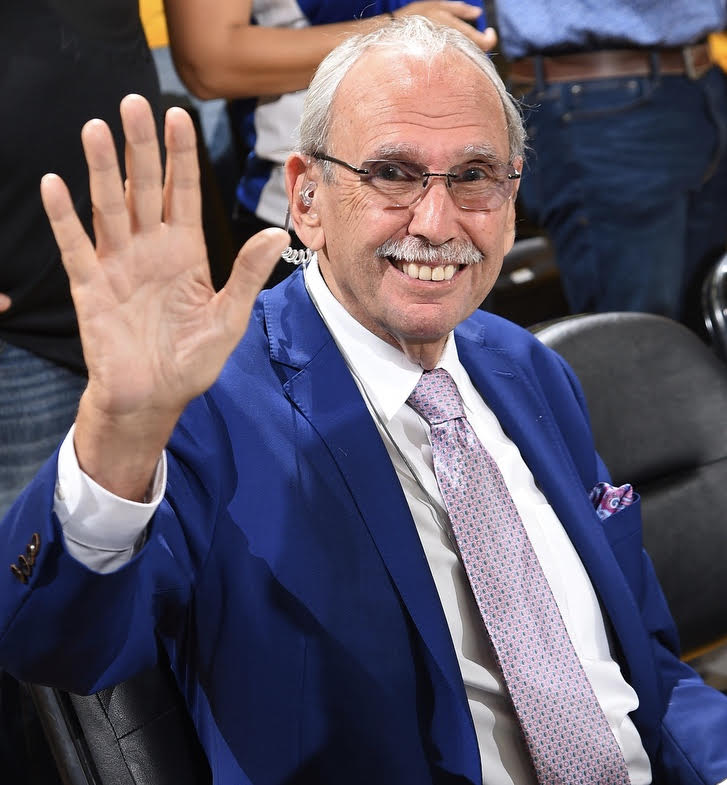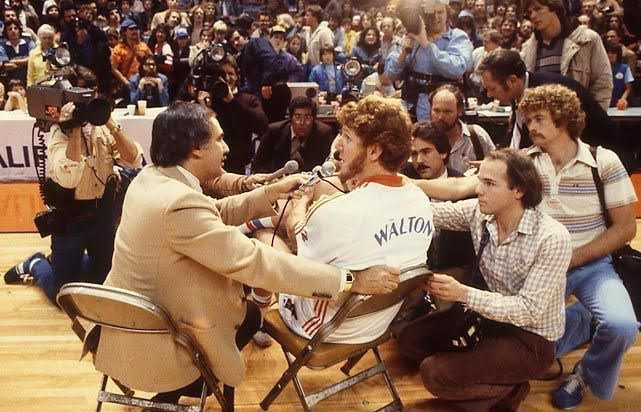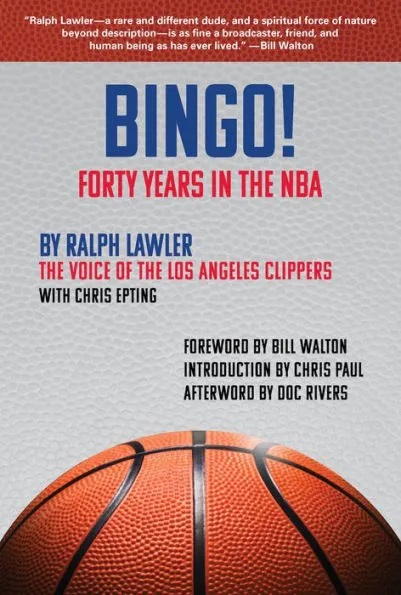
For four decades, Ralph Lawler was the voice of the Los Angeles [and San Diego] Clippers. His association with San Diego dates back to the mid-1970s when he did play-by-play commentary for the Chargers and the short-lived Sails of the American Basketball Association.
Lawler – known for his catchphrases “Oh me, oh my!” and “Bingo!”- retired in 2019. The Naismith Memorial Basketball Hall of Fame named him a Curt Gowdy Media Award recipient shortly thereafter.
On November 17, he was back in San Diego with Bill Walton at the central library branch downtown, for a Q and A promoting his new book, “Bingo! Forty Years in the NBA.”
The Coronado Times caught up with Lawler to discuss his broadcasting life and his recollections of San Diego.
Coronado Times: You came of age at a time when the most popular sports in America were baseball, boxing, and horse racing – why do you think basketball resonated so much with you as a kid in the 1940s?
Ralph Lawler: I think the fact my folks had season tickets to see Bradley [University] basketball got me going. I played all the sports as a school boy, but mom and dad had a backboard put up on our garage and that became my nonstop playground. All I really wanted to do in life was dribble and shoot a basketball. Every spare moment I had I did that. I loved playing it; I loved watching it; I loved following it.
When I got the time to thinking about writing a book I thought ‘I’m rather uniquely suited because I was there when the NBA began in 1946 and then spent 40 to 45 years in the league. I’m not sure anybody else has had that kind of association with the league.’ I saw George Mikan play; I knew George Mikan personally. I really enjoyed writing the book and thinking about some things I hadn’t thought about in decades.
CT: Does any part of you miss the early days of the NBA?
RL: I don’t think of life that way. I am more interested in the future than I am in the past. The game has changed so much – it has gone from a six-foot wide free throw a lane to 16. It is an entirely different game for a big man. If Shaq could have played under the Mikan rules, he would have scored 50 points a game. And then the 24 second clock changed the game entirely and then the three-point shot changed it again and then they took away hand checking which made it so much easier for guards. But today’s athletes are the best they have ever been and I am excited for the next chapter.
CT: You wrote in the book that you drove down to La Mesa to see Bill Walton play in high school. What do you remember about that?
RL: It took two chapters in the book to get through Bill Walton and I could have written an entire book on him. That first visit with him was revelatory. I had never seen a big man play the game like he did. He was close to seven feet tall at the time as a junior and senior in high school. His brother played with him and they just beat everybody. You knew he was going to be around the game for a long, long time.
If Bill could have stayed healthy, I think he might go down today as the greatest player of all time. Unfortunately, injuries stripped him of that.

CT: Was there a path for pro basketball to succeed in San Diego?
RL: The only scenario is if Bill had stayed healthy. I think Irv Levin would have continued to own the team. Donald Sterling would have never been with the franchise. A new arena would have gotten built. All the things that you needed to have to make San Diego an NBA city would have happened if Bill could have played 65 or 70 games a year for that team, instead of 14 in his first three years.
Everybody was so excited in San Diego and he gave basketball a chance to succeed. But his feet just wouldn’t let it happen. He feels some sense of responsibility for that to this day. But he didn’t fail, his feet failed him.
CT: The Clippers let you go twice and a chance meeting on the beach with Donald Sterling opened the door for you to come back – what do you remember about that?
RL: I was a sales manager for a Coldwell Banker office in Encinitas at the time. We had this big listing for a magnificent home right on the beach in Del Mar. Jo [my wife] was with me enjoying a sunny Sunday in Del Mar and we decided to go for a walk on the beach – had we gone north, I would have never worked in the NBA again. Instead, we turned south and ran into Donald Sterling and his assistant general manager Patty Simmons. They invited us back to his house to get in the jacuzzi and have a glass of wine. We sat there the four of us having a grand old time just talking. Sterling looks at me and says ‘Ralph why don’t you work for us anymore?’ I said ‘because your radio station didn’t want me back.’ And he said ‘well, we can change that.’
CT: Does it bother you that you have this forever link to Donald Sterling?
RL: I wish Steve Balmer bought the team 10 to 15 years earlier than he did. We were so proud to be part of a franchise that had nothing but success written all over it. You never felt that way with Sterling. There was a year they had a big newspaper ad with the number 30 written on it. The goal was to win 30 games. If you win 30 you’ve lost 52 folks.
There were always the undercurrents. You’d hear about how Sterling managed his apartments and how he dealt with women. It made you feel dirty. A lot of us who were there would talk about ourselves ‘can we continue working in these circumstances?’ But it was the NBA. There are only 30 teams and each of us had a job so many people would almost kill to get. It was just too hard and we weren’t strong willed enough to all band together and say this has got to stop.
I used to do a radio call in show and so many times the first call would be ‘Hi Ralph, I love you, but the owner sucks.’ It was downhill from there – I had 30 more minutes of that going on. It was indefensible. It was very difficult. His departure was a proud moment.
CT: Do you think it would have made any difference if 30 years ago a bunch of people with the Clippers came out publicly against Sterling?
RL: I don’t know, but I have wondered about that. Some of my contemporaries have wondered that as well. My guess is he would have just fired and replaced us. That would have been the courageous and heroic thing to do.





